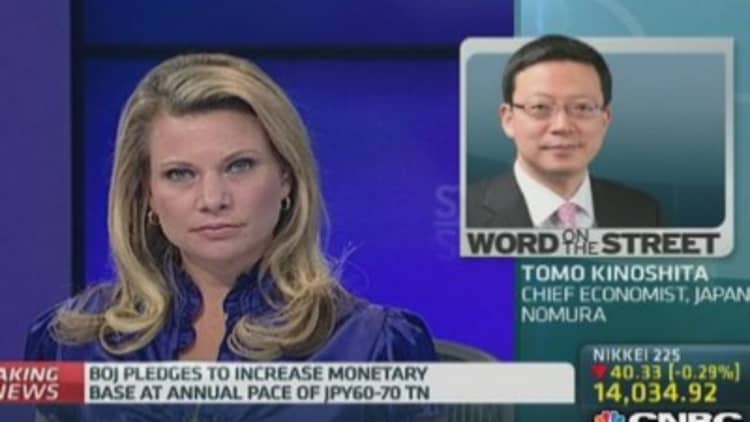Asian equities ended mixed Wednesday following a Bank of Japan monetary policy decision and as traders focused on political developments in Thailand.
In Tokyo, the Bank of Japan kept policy steady at the conclusion of its two-day policy meeting, as widely expected. Attention now falls on governor Haruhiko Kuroda's post-meeting press conference for clues on the chances of new stimulus measures. Meanwhile, the release of minutes from the Federal Reserve's last meeting are due later in the day.
Read MoreFed minutes could spark (more) market volatility
A negative lead from Wall Street also weighed on sentiment. U.S. shares declined for the first time in three sessions on Tuesday with the closing at its lowest level in almost a month.
SET gains 0.6%
Thai stocks rebounded after closing down over 1 percent in the previous session. After the military declared nation-wide martial law on Tuesday, the country's army chief met with rival political groups, encouraging them to agree to new elections this year and put an end to protests that have consumed the country since November.

Shanghai up 0.8%
China's benchmark Shanghai Composite rose for a second day, erasing earlier losses, thanks to a rally in coal stocks after the China Securities Journal reported that the National Development and Reform Commission plans to establish a few national markets for coal trading.
Lu'An Environmental Energy and Yangquan Coal rose 3.6 and 2.2 percent, respectively.
Read MoreMoney won't come cheap for China banks' funding spree
In Hong Kong, the Hang Seng Index was flat after closing at its highest level in more than a month on Tuesday.
Nikkei falls 0.2%
Japanese shares pared losses after dropping to a new one-month low below the 14,000 level earlier in the session. April trade data before the market open showed a deficit of $7.98 billion, much larger than expectations. Exports meanwhile rose an annual 5.1 percent, beating estimates.
"The trade deficit is likely to remain much smaller than it was at the start of the year, and the current account should return to surplus. In the months following the 1997 tax hike, the trade surplus rebounded by 1.5 percent of GDP, despite the drag on exports from the Asian Financial Crisis. With no such shock on the horizon, the improvement this time may be even larger," said analysts at Capital Economics in a note.

Construction equipment stocks were hit after Caterpillar reported a 13 percent drop in April retail statistics. Komatsu and Hitachi Construction Machinery lost over 3 percent each.
ASX up 0.1%
Australia's benchmark managed to close higher after hitting a fresh one-month low earlier in the session. Meanwhile, the Australian dollar hit its lowest level in nearly three weeks after May consumer confidence dropped nearly 7 percent to a two-year low on the back of the government's tough annual budget.
Miners underperformed after spot iron ore prices hit a 20-month low of $97.50. Rio Tinto and BHP Billiton closed down 1 percent while Fortescue Metals eased over 2 percent.
Woodside Petroleum rose 0.7 percent after ending an agreement to buy a 25 percent stake in Israel's Leviathan gas project.
Kospi down 0.1%
South Korean shares bounced between gains and losses in choppy trade in the absence of market-moving catalysts. Automaker Kia Motors rose nearly 2 percent.


